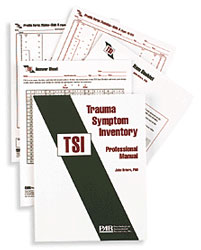Trauma Symptom Inventory™ (TSI™)
John Briere, PhD
|
| |||||||||||||||||||||||||||||||||||||||||||||||||||||||||||||||||||||||||||||||||||||||||||||||||
The TSI, a 100-item test, is designed to evaluate posttraumatic stress and other psychological sequelae of traumatic events, including the effects of rape, spouse abuse, physical assault, combat, major accidents, natural disasters, and the lasting sequelae of childhood abuse. It includes 10 clinical scales that measure the extent to which the respondent endorses trauma-related symptoms. These, in turn, can be subsumed under three broad categories of distress (trauma, self, and dysphoria). These scales include: • Anxious Arousal • Dissociation Behavior • Depression • Sexual Concerns • Anger/Irritability • Dysfunctional Sexual Behavior • Intrusive Experiences • Impaired Self-Reference • Defensive Avoidance • Tension Reduction Additionally, in contrast to other trauma measures, the TSI contains three validity scales (Response Level, Atypical Response, and Inconsistent Response), which assess the respondent’s tendency to deny symptoms that others commonly endorse, to overendorse unusual or bizarre symptoms, and to respond to items in an inconsistent or random manner. The 12 critical items also help you identify potential problems, such as suicidal ideation or behavior, substance abuse, psychosis, and self-mutilatory behavior, that may require immediate follow-up. TSI-A Reliability/Validity Administration/Scoring Responses to the 100 items are entered on the carbonless, hand-scorable answer sheet. Profile forms for males and females allow conversion of raw scores to T scores. A graph of the profile may be drawn to portray the respondent’s scores relative to general population scores. |



